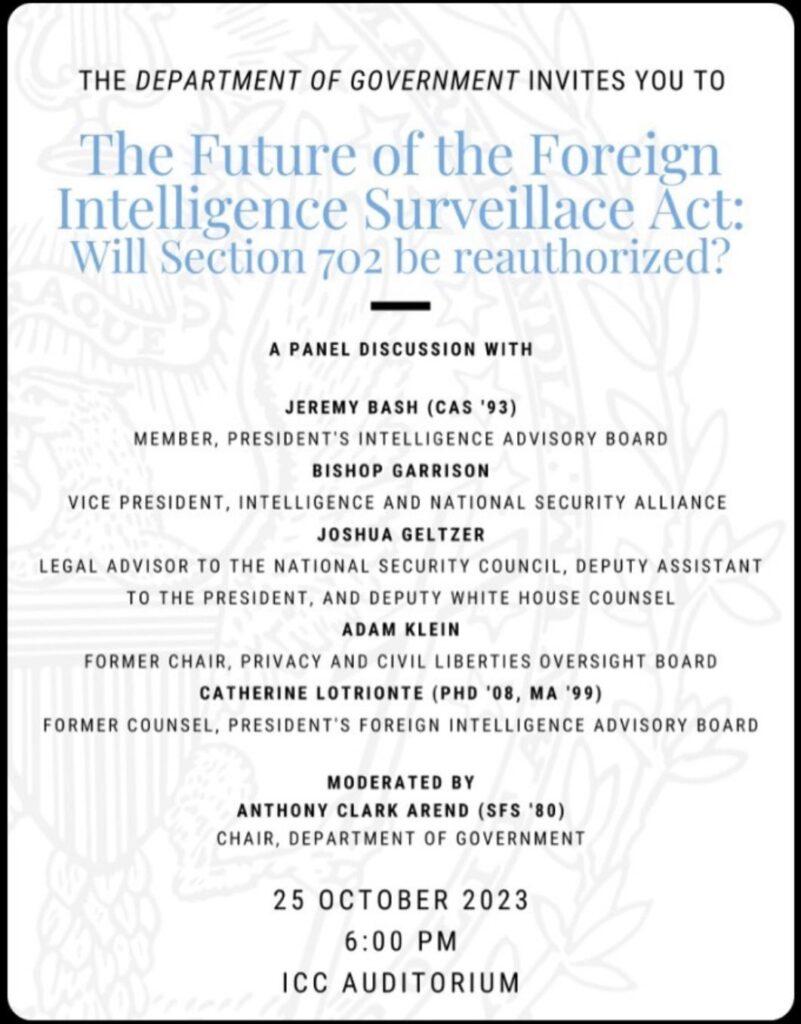The Georgetown University department of government hosted a panel discussion regarding the future of Section 702 of the Foreign Intelligence and Surveillance Act (FISA), a key facet of U.S. intelligence law, on Oct. 25.
Government department chair Anthony Clark Arend (SFS ’80) moderated the panel that featured five intelligence experts, including Catherine Lotrionte (GRD ’08, ’99), a professor of government at Georgetown; Joshua Geltzer, a legal advisor to the National Security Council, deputy assistant to the President and deputy White House Counsel; and Bishop Garrison, the vice president of the Intelligence and National Security Alliance. Adam Klein, the former chair of the Privacy and Civil Liberties Oversight Board and current Director of the Strauss Center at the University of Texas at Austin, was also part of the panel.
Each panelist represented various fields of the intelligence community, including the President’s Intelligence Advisory Board, the National Security Council and the Privacy and Civil Liberties Oversight Board.
FISA, first codified in 1978, requires U.S. intelligence agencies to obtain a warrant, viable for one year, from the Foreign Intelligence Surveillance Court before gathering intelligence information on foreign agents. Section 702 allows these agencies to target communication using American-owned electronic communication companies between non-Americans outside the country; it will sunset Dec. 31 unless Congress reauthorizes it.
Geltzer said a refusal to reauthorize Section 702 from Congress would be catastrophic for U.S. intelligence.
“There is no great alternative to what 702 offers. It would likely be the greatest intelligence failure of a lifetime to allow this to collapse,” Gelzter said.
According to Lotrionte, FISA became law as a result of unregulated intelligence activity, which the Watergate scandal first brought into the public eye.
“The executive branch needed Congress to oversee the intelligence community,” Lotrionte said at the event.
In 2008, as Lotrionte explained, to account for decades of technological advancement and reports of warrantless information collection by the Bush administration, Congress amended FISA to include tighter guidelines for whom the federal government can survey and revised the bureaucratic process of approving and conducting intelligence collection as part of Section 702.
According to Geltzer and Klein, the U.S. government uses Section 702 to extract communication data from American service providers, including Google, Meta and Microsoft.
Geltzer said Section 702 is a well-designed law that found a power balance between the executive and legislative branches.
“It is an example of congressional handiwork, in which Congress stepped up and designed something that struck a legal and privacy balance that has held us in pretty good stead for 15 years,” Geltzer said at the event.

Geltzer highlighted how the value of Section 702 will continue to increase over time due to technological advancements and as the use of American-owned electronic communications systems will increase.
“Fundamentally, it has actually increased its value over time given the nature of first technology and also the use of that technology,” Gelzter explained.
The American Civil Liberties Union, a nonprofit human rights organization, has criticized Section 702 because the U.S. government uses it to collect and analyze Americans’ and foreigners’ electronic communications, including phone calls, texts and emails, without a warrant.
Klein attributed apprehension towards Section 702 to a wider distrust in the U.S. government, especially toward the Federal Bureau of Investigation.
“Lack of trust is why we’re sitting here today. If there was trust, Section 702 would have been reauthorized already,” Klein said at the event.
Geltzer said Section 702 plays a critical role in keeping the United States prepared and safe from acts of terrorism, cyberattacks, and attacks on U.S. infrastructure.
“Of the articles that appear in the president’s daily brief, 59% percent of them include something from FISA 702. That means two-thirds of what the intelligence community thinks on any given day the president needs to see would be impoverished if we lost this authority,” Geltzer said.
Garrison said the importance of Section 702 guidelines will only increase as the world sees an increase in generative artificial intelligence, machine learning models and quantum computing capabilities.
“We’re only going to multiply, multiply, multiply our ability to interact, synthesize, and analyze this type of data,” Garrison said at the event. “We need these frameworks.”













